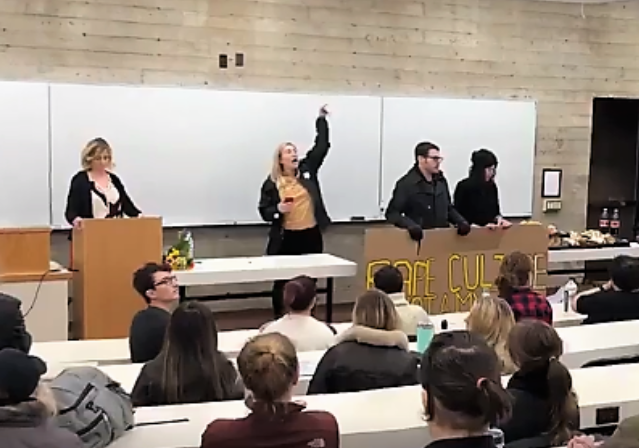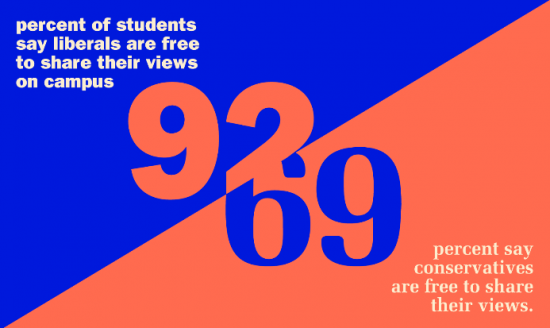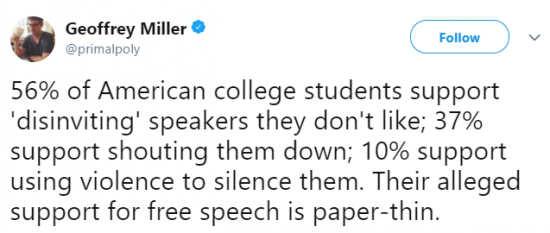Gallup/Knight Survey shows free speech crisis for conservatives on campus is real
While most students generically support free speech, a sizable portion are willing to silence opposing views, creating a campus climate in which conservatives are less able to express themselves.

Gallup and the Knight Foundation released a survey of college students on the issue of free speech. The full report (pdf.) is here. I discuss the highlights below.
Liberal writers at Vox and elsewhere are furiously trying to preempt the fallout from the survey arguing that a majority of students say they support free speech. The results of the survey, however, show that generic support for free speech is not reflected in student willingness to let free speech happen.
In fact, as the dozens of shoutdowns and disruptions we’ve documented over the years show, there is a sizable non-majority portion of the student population that is willing to support direct action to silence speakers.
Geoffrey Miller summed up the top line findings in this tweet:
56% of American college students support ‘disinviting’ speakers they don’t like; 37% support shouting them down; 10% support using violence to silence them. Their alleged support for free speech is paper-thin.
As discussed below, the survey further shows that the speech that gets stifled on campus mostly is conservative speech — by students own perceptions.
Gallup explained the survey results in an article, More U.S. College Students Say Campus Climate Deters Speech. 61% of student feel the campus climate causes people not to express their views:
Sixty-one percent of U.S. college students agree that the climate on their campus prevents some people from expressing their views because others might find them offensive. In 2016, 54% of college students held this view.
These results are based on a 2017 Gallup/Knight Foundation survey of 3,014 randomly sampled U.S. college students about First Amendment issues. The survey is an update of a 2016 Knight Foundation/Newseum Institute/Gallup survey on the same topic.
The full report is available for download here: http://kng.ht/freespeech18
Students’ perceptions that their campus climate prevents people from speaking their minds are generally similar by gender, race and ideological self-identification. However, students who identify as Democrats (63%) or independents (62%) are somewhat more likely than Republican students (53%) to think the climate at their college deters speech. That is a reversal from 2016, when Republicans were more likely than Democrats to hold this view.
The finding above is critical because one of the counter-arguments circulating widely is that there are a relatively small number of shoutdowns/disruptions relative to the total number of schools and speakers. That misses the point. The atmosphere at many campuses is so toxic (see my appearance at Vassar) that it doesn’t take a large number of incidents to terrorize the non-progressive students into silence.
Gallup further notes that the survey demonstrates how the demand for “inclusive” campuses tends to outweigh notions of free speech:
While more students now agree that their campus climate stifles free speech, fewer students now (70%) than in 2016 (78%) favor having an open campus environment that allows all types of speech, even that which is offensive. In contrast, 29% of students now, up from 22% in 2016, would rather campuses be “positive learning environments for all students” by prohibiting certain speech that is offensive or biased.
Most major subgroups of students — except Republicans — have become at least slightly less supportive of open campus environments than they were in 2016.
Knight puts it this way:
Free expression is important, but so is diversity
The majority of college students say protecting free speech rights (56 percent) and promoting a diverse and inclusive society (52 percent) are both extremely important to democracy. But when asked which was more important, students chose, by narrow margin, diversity and inclusion over free speech, 53 percent to 46 percent. Women, blacks and Democrats are more likely than their counterparts to choose inclusion over free speech.
Again, that is completely consistent with what we’ve seen. “Inclusiveness” is the codeword for driving dissenting views off campus, and as Gallup further notes, those views driven off campus are conservative:
When students perceive the campus climate as deterring certain people from speaking their minds, they may have conservative students in mind more than others. Sixty-nine percent of college students believe political conservatives can freely and openly express their views on campus. While still a majority, it is far less than the 92% who say the same about political liberals. Between 80% and 94% of students believe other campus groups, including many that have historically faced discrimination, can freely express their views.
Notably, students on both the left and right of the political spectrum tend to think conservatives are less able than other groups to express their views on campus. Sixty-six percent of liberal students and 63% of conservative students believe political conservatives at their college can freely express their views; 68% of Republicans and 67% of Democrats say the same.
These same subgroups also hold similar opinions about whether politically liberal students can openly express their views. At least nine in 10 Republicans, Democrats, liberals and conservatives believe this is the case.
Knight summarizes it this way:
Political conservatives are seen as less able to express their views
Students (54 percent) are more likely to think the climate on their campus prevents people from speaking their mind because others might take offense. While a majority of college students, 69 percent, believe political conservatives are able to freely express their views on campus, many more believe political liberals (92 percent) and other campus groups are able to share their opinions freely.

Perhaps most ominously, Knight points out the substantial percentage of students supporting direct action to stop speech they deem to be offensive:
Some students say shouting down speakers and using violence is sometimes acceptable
Many colleges struggle when inviting controversial figures to speak on campus. Ninety percent of college students say it is never acceptable to use violence to prevent someone from speaking, but 10 percent say is sometimes acceptable. A majority (62 percent) also say shouting down speakers is never acceptable, although 37 percent believe it is sometimes acceptable.
The Foundation for Individual Rights in Education (FIRE) compared the Gallup/Knight survey with FIRE’s own survey last fall, and found:
Their survey builds on a similar survey the group conducted in early 2016, and it ask questions similar to the ones asked of students in FIRE’s “Speaking Freely” survey, which was released last October.
When comparing the data between the two Gallup/Knight surveys, some interesting possible trends appear that suggest students today are less supportive of some types of speech on campus than they were in 2016:
- In the new survey, conducted in November and December of 2017, students said they preferred an “open learning environment” that allows offensive speech (70 percent) to a “positive environment” that prohibits certain speech (29 percent). However, students’ attitudes have become more speech restrictive since 2016, when the percentage point difference was 78 percent to 22 percent.
- More students today than in 2016 believe campuses should restrict slurs or “language that is intentionally offensive to certain groups” (73 versus 69 percent) and “political viewpoints that are upsetting or offensive to certain groups” (30 versus 27 percent). However, a slightly lower percentage of students today support restrictions on “costumes that stereotype certain racial or ethnic groups” (60 versus 63 percent). The declining support for restrictions on Halloween costumes could be because in early 2016, when the first survey was conducted, the Yale Halloween costume controversy was fresh in everyone’s mind. The differences here are close to the sampling margin of error of plus or minus 2 percentage points at the 95 percent confidence level for the full sample.
- More students today than in 2016 think their campus “prevents some people from saying things they believe because others might find them offensive” (61 versus 54 percent).
- Students also think that First Amendment rights are less secure today than they were in 2016: freedom of speech (64 versus 73 percent), freedom of religion (64 versus 68 percent), freedom of press (60 versus 81 percent), freedom of assembly (57 versus 66 percent), the right to petition the government (67 versus 76 percent).
There is additional interesting data from the new Gallup/Knight survey for which there are no apparent 2016 comparisons:
- There is mixed support among college students for speech codes. Forty-nine percent of students favor “instituting speech codes, or codes of conduct that restrict offensive or biased speech on campus that would be permitted in society more generally.” However, 83 percent of students favor “establishing a free speech zone, a designated area of campus in which protesting or distributing literature is permitted, usually with pre-approval.” It’s possible most students don’t know that inaptly named “free speech zones” are a type of restriction on speech – or speech code – which might explain the disparity with students’ mixed support for speech codes.
- Students narrowly prefer “diversity and inclusion” as a more important value when pitted against free speech (53 versus 46 percent).
- Students perceive that political conservatives are the least free to express their views on campus by a pretty wide margin, though most students (69 percent) believe political conservatives are free to express their views. Ninety-two percent of college students think that political liberals are free to express their views on campus.
- A majority of students (69 percent) are in favor of canceling planned speeches because of concerns about the possibility of violence. Most students, however, (72 percent) oppose disinviting a speaker because some students are opposed to the invitation. That said, FIRE’s “Speaking Freely” survey found that when students are presented with the actual names of speakers or ideologies represented by those speakers, most students (56 percent) support disinviting some guest speakers.
Another interesting finding from the Gallup/Knight survey is that a minority of students — 10 percent — report that it is sometimes acceptable to use violence to silence a speaker. The survey also found that 37 percent of students think it is sometimes acceptable to shout down speakers.
The trends are not healthy. If asked the generic question whether they support free speech, students mostly agree. But when confronted with speech they deem “hateful” or non-inclusive, a sizable portion of the student body is willing to silence opposing — and mostly conservative — views.
[Featured Image: Protesters disrupt lecture by Christina Hoff Sommers at Lewis & Clark Law School]
Donations tax deductible
to the full extent allowed by law.









Comments
The makings of a new Weimar Culture.
Or at least a Democrat Party/RINO Wiener Republic!
Of course these “snot-nosed” 1 per-centers will be no help on these matters.
“Fifty Former Failed Obama Administration Foreign Policy “Experts” Form Think-Tank To Unite Against President Trump…”
https://theconservativetreehouse.com/2018/03/12/fifty-former-failed-obama-administration-foreign-policy-experts-form-think-tank-to-unite-against-president-trump/
More things that make you go “hmmmm….?????”
“Daily Caller: CNN Used to Run a “Trump Jobs Tracker” as Part of Its “Facts First” Branding Campaign. But Then Jobs Began Growing Under Trump, And They Stopped Tracking Them.”
http://acecomments.mu.nu/?post=374285
The Brits are way ahead of us on that.
Conservative speakers JAILED in Britain:
Jailed Because She’s Conservative=> Canadian YouTuber and Activist Lauren Southern Denied Entry, Detained in the UK:
http://www.thegatewaypundit.com/2018/03/canadian-youtuber-activist-lauren-southern-denied-entry-detained-uk/
Winston Churchill’s Beliefs on Islam Would Get Him Jailed and Deported from the UK Today:
http://www.thegatewaypundit.com/2018/03/winston-churchills-beliefs-islam-get-jailed-deported-uk-today/
We rescued Britain from the Nazis for THIS?
The liberal indoctrination started about 50 years ago. When I was in high school, a history teacher took me aside and warned me to temper my persuasive talent for debate. He said that it gave my conservative views more weight and that fellow students might be swayed in the “wrong” direction.
If President Trump had not been elected, the assault upon and “criminalization” of free speech would be much farther along than it is now.
Lubyanka prison and the gulags were filled with folks who exercised free speech, and who were subsequently arrested for their “mental illness.”
That SAYS IT ALL.
RE: “..history teacher took me aside and warned me to temper my persuasive talent for debate. He said that it gave my conservative views more weight and that fellow students might be swayed in the “wrong” direction.”
Even “new math” was obviously Communist Run!
Some students say shouting down speakers and using violence is sometimes acceptable
And there it is. Free speech for me, but not for thee.
Well, Duh Donald is little better.
He’s trying to gag his porn-star playmate. (Sorry, “gag” may have been one of the things they didn’t get to in bed…)
https://hotair.com/archives/2018/03/12/trump-lawyers-trying-block-stormy-daniels-60-minutes-interview-airing/
Does Duh Donald support ANY of the Bill Of Rights? Does he understand…like…ONE…???
Your mentally ill. The blackmailing skank agreed to remain silent in exchange for money. Now someone has offered her more money to tell all and she is attempting to break her contract. You do understand contracts don’t you? I thought you were a lawyer. I guess I was wrong.
“You do understand contracts don’t you?”
Like all good progs, rags view of the law is what suits her at the moment.
Well, your comment is interesting.
You tacitly admit that Duh Donald boinked this floozy. But she was not “blackmailing” anyone, on the facts as we know them. She was approached by a T-rump factotum and offered money to keep mum. Money was paid.
But what were the conditions of the deal? You don’t know them, and I certainly don’t. Was there a breach by the serial adulterer? In contracts, their is such as thing as a breach that obviates the contract.
There is also a concept called “failure in formation”.
Finally, there’s “repudiation” in which a party may repudiate the contract and return the “consideration” paid by the other party, thereby voiding any performance.
Progressives have been able to label speech with which they disagree as “offensive” or “hateful.” How nice for them that in doing so, they don’t have to support their fascism with facts, reasoning or logic. After all, who wants to be branded as a supporter of hate speech?
Oh, to my friend “Ragspierre”, once the “exotic dancer” (read: stripper) accepted the money, she forfeited her right to comment on the affair.
Don’t see her trying to return Cohn’s 130 large, do we?
Actually, yes. We see her offering to return Duh DONALD’S hush money for the chance to publish all her stuff showing her and “Tiny Hands”.
You should know that returning money doesn’t allow you to break a contract. Are you really a lawyer?
“Are you really a lawyer?”
Many lawyers are pathetically stupid and make very low wages.
Especially proggy, that group.
Actually, it does. See above regarding “repudiation”.